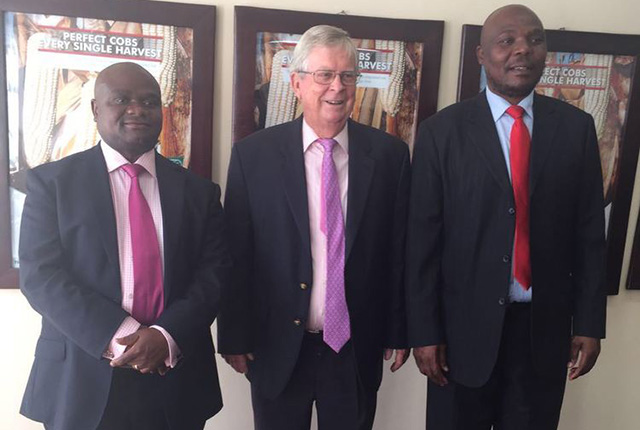It’s time G20 supports Africa’s industrilasation agenda

Lovemore Chikova : News Editor
The G20 Summit to be held in China next month is expected to discuss a variety of issues, but questions are already being asked if it will be of any useful significance to Africa. Well, the grouping, made up of both developed and emerging economies, has in the past been criticised for its lethargic approach on the case of developing countries.Many Africans are hoping that for the first time, the G20 can become more relevant to them by also focusing on issues dealing with the skewed development trajectory of the world.
This hope is pinned on China’s stance that it will push the G20 members at the meeting in Hangzhou City, the capital of Zhejiang province, to consider supporting the industrialisation of Africa.
This has given hope to Africans that China’s stance will have takers among the leaders of the group which is made up of the most developed countries and a selected emerging economies.
Chinese Foreign Minister Mr Wang Yi recently announced that his country will alert the developed countries at the G20 Summit of Africa’s urgent needs.
China, although much industrialised and the second biggest economy in the world, is still classified as a developing country because of its low GDP per capita, as some of its parts are still relatively poor.
Stating the expected discussions at the G20 Summit to Chinese and African journalists recently, Minister Wang listed his eighth point as dedicated to Africa.
“Africa and the least developed countries are in urgent need of speeding up the process of industrialisation and improving self-development capability,” he said.
“China will promote G20 member states to conduct cooperation and help these countries to accelerate industrialisation and through capacity building, increasing investment, improving infrastructure and other measures, so as to achieve their poverty alleviation and sustainable development goals.”
African development experts say given its status, China can successfully act as a “broker” to leverage both political and economic power between developed and developing countries.
This is because the Asian country is the world’s second largest economic power, a position that is crucial to influence both global economic and political issues.
There is also a wide thinking among pundits from Africa that time might also have come for developed countries to realise that skewed development might in future cause more problems to the global economy.
South African-based researcher on African development Dr Tapiwa Gomo said in an interview this week that members of the G20 should draw lessons from China’s experience on cooperation with African countries.
“One of the lessons is that the developed and the developing countries now need each other more than ever before,” he said.
“This has created the need for a new economic order governed by new rules of engagement which place the developing and the developed countries at par and as equal trading partners.”
Dr Gomo said G20 members should look at examples in African countries such as Ethiopia, the Democratic Republic of Congo, Cote D’Ivoire, Mozambique and Tanzania where China has strong investments in infrastructure.
“It is my view that these may be some of the lessons which China wishes to share and advocate with G20 members while emphasising that developing and developed countries now need each other more than ever before,” he said.
“China views the summit as an opportunity to advocate for balanced growth and global trade reforms which should lead to a more open and unconditional global economy.”
Apart from developing the infrastructure, China has shown a strong interest in establishing factories in African countries to help boost the manufacturing base, expand the economy and create employment.
The Asian economic giant has big infrastructure projects worth billions of dollars at various stages of implementation in various African countries.
It is China’s principle of emphasising mutual respect, equality in partnership and win-win cooperation that can serve important lessons to developed countries at the G20 Summit.
Africa has since adopted its Agenda 2063, an ambitious programme to have all the 54 countries on the continent enjoying some form of industrialisation by then.
It is important that China, through the Forum for China-Africa Cooperation (focac), is at the forefront of supporting Africa’s industrialisation agenda.
At the last focac meeting in South Africa last year, President Xi Jinping pledged $60 billion towards Africa’s development agenda, with more financial resources expected in the near future.
To show its desire to push Africa’s case at the summit, China has invited more African countries, apart from South Africa, the only G20 member from Africa.
Chad has been invited as the African Union chair, Senegal will attend as the chair of the New Partnership for Africa’s Development and Egypt will also be at the summit.
A manager at Southern African Development Community (sadc) Council of Non-Governmental Organisations, which is based in Botswana, Mr Rangarirai Machemedze said China’s stance for the G20 Summit was meant to uplift developing countries.
Mr Machemedze focused on the trade and development dividend between China and Southern Africa in his dissertation for his Masters Degree.
He noted that in sadc, leaders adopted the industrialisation strategy and road map last year, but what is now fundamental is to transform it into actionable plans.
“Africa’s industrialisation has been on the agenda of many different forums, including African Union summits,” he said. “In fact, the industrialisation of the continent is long overdue.
“Hence, China’s invitation (of developing countries to the G20 Summit) is not only strategic to giving momentum to this, but is also a statement that the continent has been left behind and this is the time to give it an opportunity to express itself around industrialisation issues.
“It is also a time to give a platform to those that can assist to pronounce themselves in the different sectors.”
Writing on his blog, African Capacity Building Foundation executive secretary Professor Emmanuel Nnadozie said the under representation of Africa, with only one member in the G20, had disadvantages.
“It is no surprise then that the continent’s priorities are not fully incorporated into the G20 agenda,” he said. “Yet Africa can no longer remain on the margins where global leaders are making decisions on the world economy.
“The continent has a duty to convince the grouping to address its major concerns, particularly the strengthening of productive capacity, increasing productivity, value addition and accelerated industrialisation.”
The analysts note that with the help of China, Africa’s is set to become a permanent subject of G20 meetings, starting with the Hangzhou meeting.
So, Africans will be following the summit with keen interest, hoping that other nations, especially the G20 members, can draw lessons from China’s cooperation with the continent.
A number of meetings have already been held in preparation for the summit, including the third G20 Finance Ministers and Central Bank Governors meeting in Chengdu last month and the G20 Labour and Employment Ministerial meeting in Beijing, also last month.
The other meetings were the G20 Energy Ministerial meeting in Beijing, G20 strong sustainable and balanced framework working group meeting in Xiamen and the fourth meeting of G20 Green Finance study group in Xiamen, all last month.
G20 was established in 1999, to bring together both developed and developing countries to discuss key issues in the global economy.
This article also appeared on People’s Daily Online in China where Lovemore Chikova is on attachment .







Comments